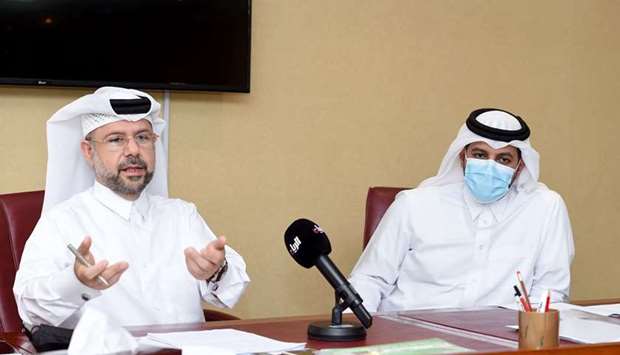Qatari fish farms are expected to annually produce around 600 tonnes of tilapia, almost equal to a quarter of the imported quantity, but at an attractive price, a senior official announced yesterday.
Mohamed Mahmoud al-Abdullah, head of the fish farming section at the Fisheries Department at the Ministry of Municipality and Environment (MME) was addressing a press conference about the national initiative to encourage the production of tilapia fish in Qatari farms.
"The fisheries sector in the country has made major strides to develop farms and maintain the food security strategy in the sector," he explained in the presence of Hamad Hadi al-Hajiri, head of the programmes and projects section at the Food Security Department, and a number of specialists.
Al-Abdullah pointed out that the Fisheries Department aims to support the owners of farms and improve their income while increasing the diversity of fish products in the local market and maintaining the national fish wealth, as the country imports around 2,000 tonnes of tilapia fish a year.
Accordingly, licences will be granted to two strategic projects for the production of tilapia fish at registered farms, with an estimated production capacity of around 310 tonnes a year, per project.
Al-Hajiri stressed that the Food Security Department has many other initiatives and projects to be launched in the future according to the National Strategy for Food Security in co-ordination with various departments and sections in the Agriculture Sector.
For instance, a number of related initiatives and projects were launched earlier, including the production of table eggs in the Qatari farms, fortified and green livestock fodder, and greenhouses. Besides, nine projects were launched recently to fatten and raise sheep and livestock.
Qatari nationals having a registered farm are eligible to apply for the tilapia farming project. Qatar Development Bank offers loan to farms that fulfill certain criteria. The qualified farms should start production during the first year of obtaining the necessary license and reach the maximum production capacity of 310 tonnes per year during the third year of the project, according to the technical and economic feasibility study. The farmed tilapia fish will be exclusively marketed in Qatar.
"The fisheries sector in the country has made major strides to develop farms and maintain the food security strategy in the sector," he explained in the presence of Hamad Hadi al-Hajiri, head of the programmes and projects section at the Food Security Department, and a number of specialists.
Al-Abdullah pointed out that the Fisheries Department aims to support the owners of farms and improve their income while increasing the diversity of fish products in the local market and maintaining the national fish wealth, as the country imports around 2,000 tonnes of tilapia fish a year.
Accordingly, licences will be granted to two strategic projects for the production of tilapia fish at registered farms, with an estimated production capacity of around 310 tonnes a year, per project.
Al-Hajiri stressed that the Food Security Department has many other initiatives and projects to be launched in the future according to the National Strategy for Food Security in co-ordination with various departments and sections in the Agriculture Sector.
For instance, a number of related initiatives and projects were launched earlier, including the production of table eggs in the Qatari farms, fortified and green livestock fodder, and greenhouses. Besides, nine projects were launched recently to fatten and raise sheep and livestock.
Qatari nationals having a registered farm are eligible to apply for the tilapia farming project. Qatar Development Bank offers loan to farms that fulfill certain criteria. The qualified farms should start production during the first year of obtaining the necessary license and reach the maximum production capacity of 310 tonnes per year during the third year of the project, according to the technical and economic feasibility study. The farmed tilapia fish will be exclusively marketed in Qatar.

